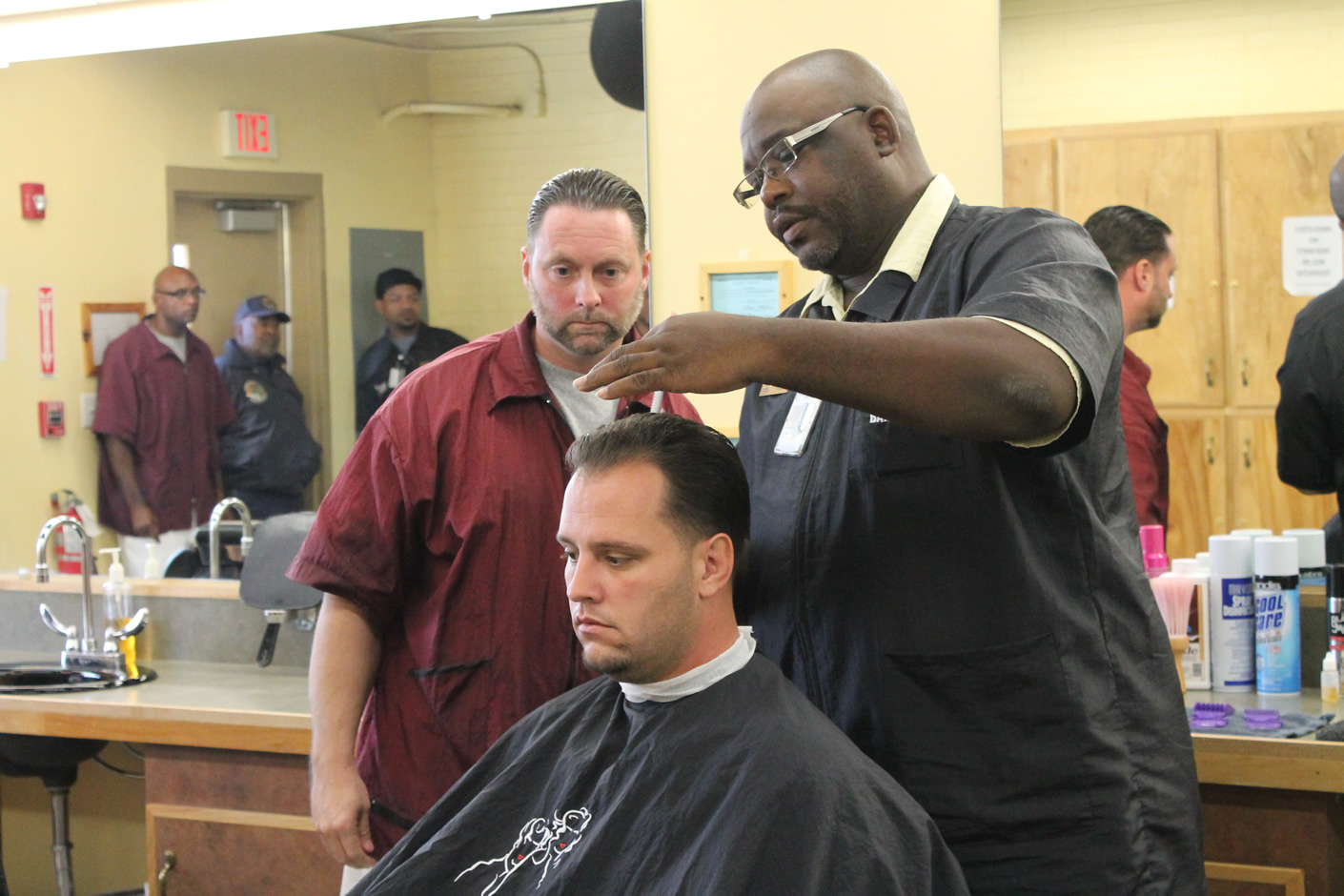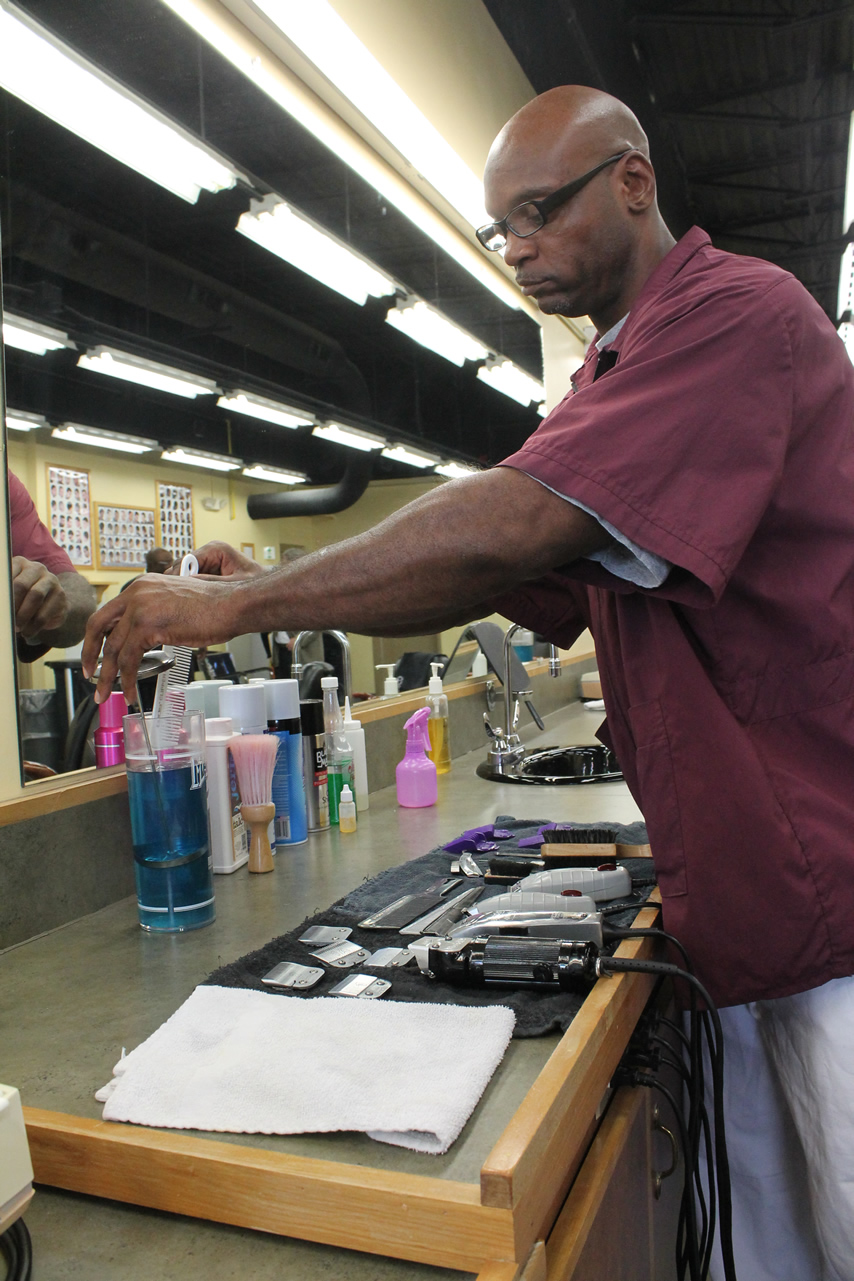College News
CCCC Barber Program Offers Inmates Fresh Start
Notice: This article is older than 12 months. Names, contact information, programs, titles, etc. might have changed. If you have any problems please call the main college number, 1-800-682-8353, and we will be happy to direct you accordingly.

click image to enlarge ⊗
Daily Record Photo/Oonagh McQuarrie - Kevin Lewis, on the left, watches as instructor Reginald Dowe ... (more)

click image to enlarge ⊗
Daily Record Photo/Oonagh McQuarrie - Brian Brooks, in his apprenticeship with the barber program, ... (more)
11.25.2014 • College & Community • College General
By Oonagh McQuarrie, The Daily Record of Dunn
The small building inside Harnett Correctional Institution looks unassuming from the outside, but inside, inmates are getting a chance at a fresh start.
"This has made me a more professional person," said Brian Brooks, an apprentice with Central Carolina Community College's barber school program. "I got in this project to better myself, to be more productive."
The program is run by CCCC and operates in Harnett Correctional, the only program of its kind in North Carolina.
"We get letters from people from all over the state," said one of the program's staff members. "We have between 80 and 100 people vying for 20 slots."
To get into the popular program, applicants must pass a stringent selection process.
To apply, the inmate or the inmate's case manager must send a letter to the facility expressing their interest. To be eligible to apply, inmates must have between 36 and 72 months remaining on their sentence. Inmates who have been convicted of sex offenses, first-degree murder, gang-related offenses, or who have a drug conviction within 300 feet of a school are not eligible for the barber program. The inmate's disciplinary history and success in other programs are all considered before inmates are accepted.
The two-year program includes one year of instructional time and one year of apprenticeship time in the prison's barber shop. The apprentices get plenty of practice during their tenure. Harnett Correctional holds around 1,000 inmates. The prison's barber shop can do more than 2,000 haircuts a month.
After inmates finish their two-year apprenticeship, they are sent to other licensed barber shops around the state until their release date, at which time they take the North Carolina Barber Board exam to get their permanent license.
After the apprenticeship period is over, students will have accrued more than 1,500 instructional hours, and the instruction isn't strictly limited to cutting hair.
Other Skills
Instructor Reginald Dowe said the men "have to have the right mindset to succeed," because the barber program is challenging.
"There's the technical part of the learning, the actual cutting the hair, but there's also the business part of things which includes the soft skills," Mr. Dowe said. "You're going to have so many personalities in the chair, you have to be professional with every customer, be tactful with every customer and know all the styles. You have to really listen to your client so you know, OK, they're asking for this hairstyle, but how do they really want their hair."
Student Micheal Bynem said learning the "soft skills" was a challenge for him, but that developing those talents has been worthwhile.
"I love this program so much because you can do something you love to do and it takes some of the pain off you, living in here," he said. "And the other guys come in, the rapport you have with them, you see them smiling and laughing, I think it takes some of their pain away too."
Although the program is demanding, students say that is part of the appeal.
"Having that knowledge and learning about the anatomy and the chemistry and all the other aspects that go into this, I love that," Mr. Bynem said. "I love to learn. I feel like I'm alive again. I think we as humans yearn for knowledge and as you get older you become stagnant, and this is just ... a breath of fresh air to me, to be able to learn and practice what I learn."
The program offers inmates the same education students at CCCC's campuses would receive, and at a similar cost.
"We can't afford to have a person in this program who can't handle it," said Bill Tyson, provost of curriculum administration, who runs the prison program. "Tuition costs us around $4,000 a year per inmate, and we don't get paid upfront, we're reimbursed. We have to aim for 100 percent to earn enough back to keep the program going."
Saving The State Money
Although $4,000 may sound like a lot to spend on inmates, the barber program, as well as the other vocational programs CCCC offers through the prison, actually save the state a lot of money.
"The state is paying $33,000 a year per inmate to keep inmates in North Carolina, it costs us $4,000 a year to educate them, so we're saving a lot of money," Mr. Tyson said. "We're giving folks an opportunity to earn a living and saving the state some money. Anything we can do to stop them from coming back into the system is worth it."
It seems like the program is working. Last year's graduating class started with 20 students, 18 remained in the program and all 18 passed their license exam on the first try.
"It's very nerve wracking. We want to know that our folks have learned enough to pass," Mr. Tyson said. "The college is required to have 80 percent of those students pass on the first try. We had 100 percent that passed this year. When you send students to the testing and they come out and they've passed, that's such a great thing."
One of the many challenges facing inmates in the barber program is staying current with the styles and trends happening outside the prison walls.
"We show them the different hairstyles but some of the styles they're not allowed to wear in here, so after the cut we give them a bald head or a buzz," Mr. Dowe said. "But they need to know what's new."
Trying to keep students up to date with what's happening outside the correctional facility walls is just one part of the process. For students in the program, dealing with life inside the walls can he a struggle too.
"The hardest part for me are the things we have to deal with outside the shop. This is a safe haven, it's like its own little place here," said Shawn Walker, a student in the program. "We put on those smocks, and we're barbers, not prisoners."
That is a common refrain among students in the barber program. Many of them have been incarcerated for much of their adult life, and until entering the barber program, never pursued a career.
"They appreciate the program, a lot of them have wanted to become a barber, maybe they were cutting hair on the street but never pursued it to get a license," Mr. Dowe said. "They have an opportunity to fulfill their dreams. This is giving them something they can depend on. Many of these guys have been incarcerated for so long, they don't have any family to depend on when they get out."
The program, according to its students and its teachers, gives inmates another chance at a productive life outside prison walls.
"It's giving guys the chance to learn a trade. There's a lot of talent in prison," said apprentice Kevin Walker. "I'm getting ready to be released and I want the license and to get to be an instructor. Having the chance to learn these things, this is the best thing to ever happen to the Department of Corrections."
Aiming Higher
"I didn't have any idea what I was going to do with my life, and it's so good to have a dream again," Mr. Walker said. "I've been incarcerated for most of my life, I needed a trade. You can go further than opening a shop, you can learn to go out there and be a public servant. This gives you the chance to give back to the communities you took from."
According to Mr. Dowe, the program changes the way his students view themselves.
"I can see the growth, not only in learning how to cut hair, but I can see them growing as a person," he said. "They see the program will help them be a better father, a better part of their family. That is completely gratifying to see that big turnaround."
Mr. Dowe said a big part of creating that turnaround is the sense of accomplishment the students feel when they graduate.
"They've actually completed something, they set out to do something, for two years, and did it," Mr. Dowe said. "I think that helps them. It's very gratifying to see them graduate, get their diploma. You can see them, they feel as though they're worthy."
Categories
- Admin, Faculty & Staff Category
- Arts & Entertainment Category
- Clubs Category
- College & Community Category
- College General Category
- Continuing Education Category
- Curriculum Programs Category
- Distance Education Programs Category
- Facilities/Buildings Category
- Finances Category
- Foundation Category
- Graduations Category
- Lee Early College Category
- NCCCS Category
- SGA Category
- Special Events Category
- Sports Category
- Students/Graduates Category
- Uncategorized Category
Archives

